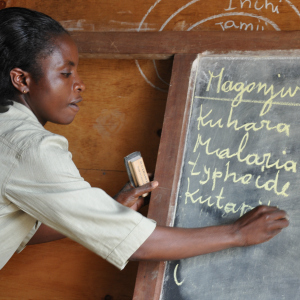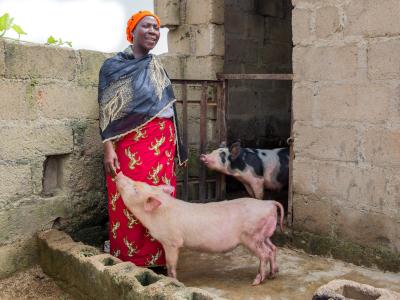 A life skills class on disease prevention
A life skills class on disease prevention
Growing up in rural South Sudan, Regina never learned basic hygiene practices. She did not know that quickly rinsing utensils before serving food would not clean them. She did not realize that washing clothes with soap and sweeping her home were important to keeping her and her family healthy. Neither she nor her neighbors were aware that the water they pulled from the local well was dirty – and potentially deadly.
In the countries where we work, health education and basic healthcare services are limited, particularly in remote and rural areas. For 20 years, we have provided women like Regina with basic health information on nutrition and hygiene, sexual and reproductive health, stress management, and other common and emerging health challenges. We work with local partners and connect women to healthcare providers that provide professional and ongoing support during and after our program. With knowledge and resources, women like Regina can make health-based choices that protect their dignity and well-being.
Using what she learned in our program, Regina began practicing simple sanitation measures to keep herself and her family healthier. Inspired to do more, she brought the women of her community together and shared the risks of drinking dirty water. She convinced them to organize efforts to clean and deepen the well. Through her work, her community will have a steady supply of fresh water.
How We Do It
Regina’s story is just one of the many ways women are taking action to protect their and their family’s health. For example, within two years of finishing our program, three times as many women practice family planning. Learn more about the ways we help women develop greater health and well-being.
Access to Sexual and Reproductive Health Services
In Kosovo, our trainers discuss the importance of regular mammograms and Pap smears. They have helped women negotiate lower group testing fees and organized transportation for participants to access these gynecological services.
Committed to Improving Knowledge and Access
We regularly evaluate and review the health curriculum in each of our country offices to ensure it provides women the most updated, accurate information and addresses the greatest health concerns they face. We also work to connect our program participants with local healthcare services available to them.
Access to HIV Testing, Counseling, and Treatment
Where we work in Nigeria’s Plateau State, recurrent conflict has led to high rates of HIV, with nearly 1 in 13 adults infected. Young women are more than twice as likely to have HIV as young men. Our Nigeria office works with the Mashiah Foundation in Jos to provide voluntary counselling and HIV testing services to participants, and refers those who test positive to district hospitals and to the Faith Alive Foundation for counseling, antiretroviral drugs, and support groups.
In 2013, 43 of the 1,644 women tested were found positive and received the support of referral services and our life skills trainers.
Committed to sharing our expertise addressing HIV/AIDS, we work closely with numerous national and state groups, including: the National AIDS and STI Control Program (NASCP), State Action Committees on HIV/AIDS (SACAs) in Enugu and Jos, the Civil Society on HIV/AIDS in Nigeria (CISHAN), and the technical working group on Enhancing Nigerian Response to HIV/AIDS.
Purifying Water, Saving Lives
In 2013 in Baghdad, our program participants learned from a local expert how the area’s poor water quality could put them and their families at risk of disease. The women were also connected to a nearby health center where they could receive monthly water purification tablets to reduce their risk.
1. This analysis includes participants who were enrolled between October 2009 - October 2010. Data are self-reported at enrollment, graduation, one-year post-graduation, and two years post-graduation. Only participants who were surveyed at all four of these points in time are included in this analysis. Scientifically establishing cause and effect with respect to any program is an involved effort that takes place over years. WfWI's Monitoring, Research, and Evaluation team is engaged in ongoing efforts to establish the effects of our programs more definitively.
